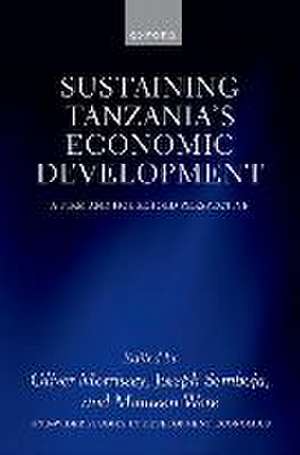Sustaining Tanzania's Economic Development: A Firm and Household Perspective: WIDER Studies in Development Economics
Editat de Oliver Morrissey, Joseph Semboja, Maureen Wereen Limba Engleză Hardback – 5 mar 2024
Din seria WIDER Studies in Development Economics
- 30%
 Preț: 504.34 lei
Preț: 504.34 lei - 26%
 Preț: 733.49 lei
Preț: 733.49 lei - 30%
 Preț: 597.88 lei
Preț: 597.88 lei - 17%
 Preț: 594.16 lei
Preț: 594.16 lei - 7%
 Preț: 159.68 lei
Preț: 159.68 lei - 13%
 Preț: 737.02 lei
Preț: 737.02 lei - 17%
 Preț: 583.39 lei
Preț: 583.39 lei - 30%
 Preț: 501.49 lei
Preț: 501.49 lei - 30%
 Preț: 724.70 lei
Preț: 724.70 lei - 30%
 Preț: 748.64 lei
Preț: 748.64 lei - 31%
 Preț: 434.64 lei
Preț: 434.64 lei - 18%
 Preț: 333.97 lei
Preț: 333.97 lei - 34%
 Preț: 848.58 lei
Preț: 848.58 lei - 34%
 Preț: 847.76 lei
Preț: 847.76 lei - 34%
 Preț: 803.83 lei
Preț: 803.83 lei - 34%
 Preț: 954.23 lei
Preț: 954.23 lei - 34%
 Preț: 892.48 lei
Preț: 892.48 lei - 22%
 Preț: 188.78 lei
Preț: 188.78 lei - 30%
 Preț: 617.12 lei
Preț: 617.12 lei - 18%
 Preț: 334.18 lei
Preț: 334.18 lei - 27%
 Preț: 378.41 lei
Preț: 378.41 lei - 34%
 Preț: 1039.04 lei
Preț: 1039.04 lei - 34%
 Preț: 1043.37 lei
Preț: 1043.37 lei - 27%
 Preț: 329.58 lei
Preț: 329.58 lei - 34%
 Preț: 1292.22 lei
Preț: 1292.22 lei - 23%
 Preț: 1213.11 lei
Preț: 1213.11 lei - 34%
 Preț: 879.41 lei
Preț: 879.41 lei - 19%
 Preț: 652.21 lei
Preț: 652.21 lei - 34%
 Preț: 1039.15 lei
Preț: 1039.15 lei - 34%
 Preț: 892.84 lei
Preț: 892.84 lei - 27%
 Preț: 443.57 lei
Preț: 443.57 lei - 22%
 Preț: 526.67 lei
Preț: 526.67 lei - 30%
 Preț: 913.24 lei
Preț: 913.24 lei - 34%
 Preț: 997.55 lei
Preț: 997.55 lei - 31%
 Preț: 396.19 lei
Preț: 396.19 lei - 17%
 Preț: 413.16 lei
Preț: 413.16 lei - 34%
 Preț: 1188.13 lei
Preț: 1188.13 lei - 34%
 Preț: 817.30 lei
Preț: 817.30 lei - 30%
 Preț: 1012.76 lei
Preț: 1012.76 lei - 7%
 Preț: 360.77 lei
Preț: 360.77 lei - 31%
 Preț: 447.33 lei
Preț: 447.33 lei - 27%
 Preț: 1295.58 lei
Preț: 1295.58 lei - 31%
 Preț: 441.21 lei
Preț: 441.21 lei
Preț: 473.92 lei
Preț vechi: 654.97 lei
-28% Nou
Puncte Express: 711
Preț estimativ în valută:
90.68€ • 94.68$ • 75.05£
90.68€ • 94.68$ • 75.05£
Carte disponibilă
Livrare economică 03-10 martie
Preluare comenzi: 021 569.72.76
Specificații
ISBN-13: 9780192885746
ISBN-10: 019288574X
Pagini: 240
Dimensiuni: 164 x 240 x 22 mm
Greutate: 0.51 kg
Editura: OUP OXFORD
Colecția OUP Oxford
Seria WIDER Studies in Development Economics
Locul publicării:Oxford, United Kingdom
ISBN-10: 019288574X
Pagini: 240
Dimensiuni: 164 x 240 x 22 mm
Greutate: 0.51 kg
Editura: OUP OXFORD
Colecția OUP Oxford
Seria WIDER Studies in Development Economics
Locul publicării:Oxford, United Kingdom
Notă biografică
Oliver Morrissey is Professor in Development Economics and Director of CREDIT, School of Economics, University of Nottingham, and a Managing Co-Editor of the Journal of Development Studies. His primary research interests lie in aid policy (fiscal effects and conditionality), trade policy reform (including impacts on households), taxation, agricultural production, and labour markets, all with a focus on sub-Saharan Africa. He has published numerous articles in international journals, co-edited eight books and contributed to over 50 edited volumes.Joseph Semboja is the founding Chief Executive of UONGOZI Institute, also known as the Institute of African Leadership for Sustainable Development, an unprecedented organization in Tanzania concerned with executive education, policy dialogue, and research. He is known for his in-depth knowledge of socioeconomic development within Tanzania, as well as aspects of leadership, particularly within the public service. His career has spanned socio-economic research, senior management, and advising on the development, implementation, and analysis of major strategic policy and reform in Tanzania, where he has published several articles and books.Maureen Were is a Senior Economist in the Research Department at the Central Bank of Kenya. She spearheaded the work in this book while working as a UNU-WIDER researcher responsible for the collaborative research with the UONGOZI Institute in Tanzania, 2018-2021. She has a wealth of experience in economic policy, research, macroeconomic modelling, and teaching, and her main research interests include macroeconomics, financial inclusion, trade, and gender perspectives on development. She has authored several articles in refereed journals, working papers, and book chapters.
